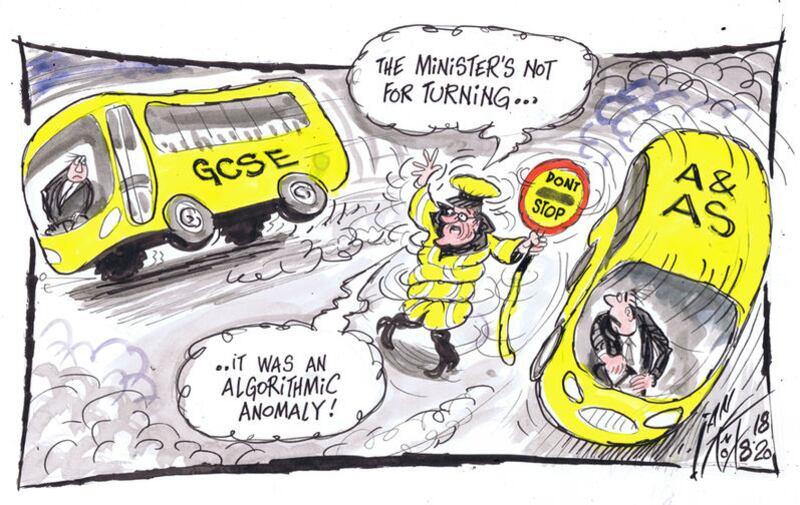Universities are bracing themselves for a chaotic influx of fresh applications after thousands of A-level results were upgraded.
The proportion achieving A*-A grades now stands at 43 per cent after yesterday's U-turn when Education Minister Peter Weir announced teacher predicted grades will be allowed to stand.
The focus now shifts to universities and how they will respond. Queen’s University Belfast and Ulster University have issued unconditional offers to almost 5,000 students already.
However, many young people had offers elsewhere withdrawn based on last week’s results. Armed with a better set of grades, they are now likely to be in a position to demand their places.
Experts are warning that universities will now come under intense pressure to process a raft of new applications. There will be added complications as well if some students change their mind if their new grades are better.
The north’s universities already argue that they have their number capped unjustly. For courses including medicine, dentistry, social work and teaching, there is a risk that institutions will be overwhelmed if there are now more applicants with the required grades than there are places.
Given that the universities have already taken up so many students, and may now be required to accept more, there could also be a knock-on to further education colleges.

In a statment released last night, Queen's University Belfast said: "It should be noted that the university has genuine capacity restrictions in terms of teaching space, teaching staff and accommodation that have to be taken in to account in order to protect the educational integrity for all of our students.
"These issues are particularly complex this year due to the need to preserve social distancing and keep our staff and students safe. It is therefore imperative that the university receives clarity on the provision of revised results and, the support that will be provided by government as soon as possible."
Almost 40 per cent of the 'standardised' results issued last week are set to be boosted following yesterday's announcement.
Ministers across Britain and Northern Ireland agreed yesterday that the "balance of fairness" now lay with centre assessed grades (CAGs).
There had been concerns that some young people would be disadvantaged when seeking university places if regions adopted different approaches.
About three in 10 sixth formers in the north go on to higher education in Britain.
Yesterday's major policy shift comes amid a raging controversy about the system used to allocate A-level grades.
It had to be introduced following the cancellation of all summer public exams.
The assembly is due to be recalled from summer recess on Tuesday to debate the furore.
Read More:
- Peter Weir to face assembly questions after A-level grading u-turn
- Analysis: Decision on awarding grades could have been taken months ago
- Lucy's dreams of studying medicine at QUB still alive after A Levels u-turn
More than one third of A-level results in Northern Ireland were initially 'downgraded' after exams regulators used an algorithm based on teacher assessed grades.
While teachers were outraged at suggestions of leniency, the unstandardised results - based on their projections only - are record-breaking.
The proportion achieving an A*-A is expected to jump to about 43 per cent - up from the approximately 30 per cent it has been for the last few years.
The A* will now leap from 8.9 last year per cent to 13.2.
Mr Weir said all qualifications would be awarded the higher of the grade submitted by their centre or the final result calculated by CCEA. This means that the 5.3 per cent of entries that the algorithm upgraded will be remain unchanged.
"CCEA is working to release the revised results to candidates as quickly as possible. In the interim,students will be able to access details of their centre assessed grade from their school or college," Mr Weir said.
"Concerns remain over the impact of changes to the qualifications system throughout the United Kingdom and any potential solution offered has its flaws. However, my prime concern is to ensure that young people in Northern Ireland are in no way disadvantaged in comparison to their peers elsewhere. Portability and comparability of qualifications is critical for students, particularly in Northern Ireland.
"Whilst standardisation is normally an important feature of awarding qualifications, these are truly unique circumstances and this approach is now being adopted across the UK. This is why I have taken this decision."
Sinn Féin's Karen Mullan, who is deputy chair of the assembly education committee, said it was the "only sensible response".
Daniel McCrossan of the SDLP said it was "a win for our teachers and their professional judgement".
Head teachers also welcomed the intervention.
Michael Allen from Lisneal College in Derry said: "It's a little chilling that algorithms are applied each year to ensure that a portion of students are awarded the lowest grades. Surely we can move closer to a system when each individual is awarded solely on their own performance."
Meanwhile, it has emerged that in the days before the issue of results, Ulster University changed about 2,000 student offers from conditional to unconditional.
Queen's University Belfast had earlier made 2,500 such offers to young people.
"Prior to A-level results being distributed, Ulster issued approximately 2,000 unconditional offers to applicants, where appropriate to ensure a consistent university admissions process for Northern Ireland, support the wellbeing of applicants and ensure they were fully informed," a UU spokeswoman said.
"In this very challenging year for students, the university is committed to remaining as flexible as possible, to ensure that all those who wish to access higher education are provided with an opportunity to do so."








